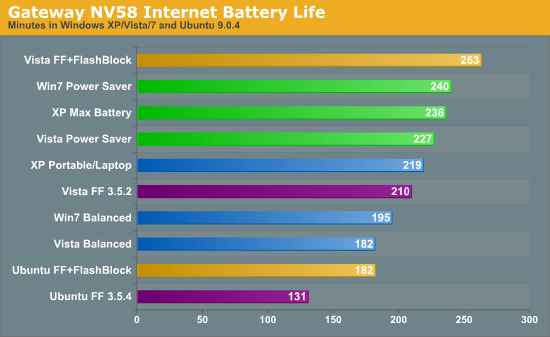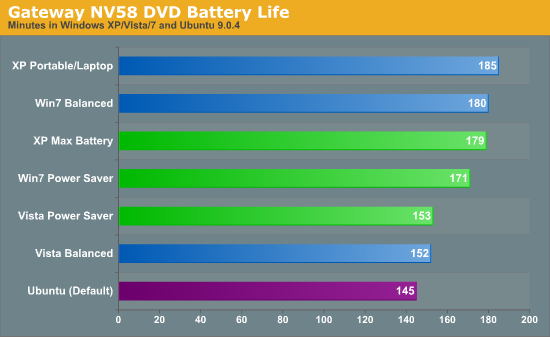Gateway NV58 (Intel) - Battery Life
We first looked at AMD's mobile platform with several operating systems and now it's Intel's turn. Once again, here's the rundown of specifications followed by the results, starting with battery life.
| Gateway NV5807u Test System | |
| Processor | Intel Core 2 Duo T6500 (Dual-core, 2.1GHz, 2MB shared L2, 45nm, 35W, 800MHz FSB) |
| Memory | 2x2048MB Micron PC2-5300 @ DDR2-667 5-5-5-15 (Micron Technologies 16HTF25664HY-667G1) |
| Graphics | Integrated Intel GMA 4500MHD Driver version 15.13.4.64.1829 10 Shaders at 475 MHz |
| Display | 15.6" Glossy WXGA (1366x768) LG LP156WH2-TLE1 |
| Hard Drive | HITACHI Travelstar 5K500.B 320GB 5400RPM 8MB (HTS545032B9A300) |
| Optical Drive | 8x DVDRW (TSST Corp TS-L633B) |
| Battery | 6-Cell 10.8V, 4400mAhr, 47.5Whr |
| Operating System | Windows Vista Home Premium 64-bit |
| Price | NV5814u available online starting at $580 |


If you expected the standings to remain the same regardless of computer hardware, you might be in for a bit of a surprise by the above charts. This time, Windows XP wins in both DVD playback results, providing better battery life using the "Portable" profile than the "Max Battery" profile. Windows 7 also performs slightly better on DVD playback using the Balanced profile, whereas we saw virtually no difference between the power profiles using the NV52.
Why is Balanced beating Power Saver this time? Intel's SpeedStep technology appears to be better than AMD's PowerNow!, though minor differences in drivers may also contribute to the standings. The theory is that letting your CPU run at 100% for a short time and then returning to minimum power draw as fast as possible results in the best battery life, which is why setting the maximum CPU state to 50% isn't always the best idea. Intel CPUs are supposed to switch between C-states faster than AMD CPUs, or so we've heard, and these results seem to support that idea. However, the Internet battery tests again all favor the power saving profiles by a large margin, so power saving profiles can have a positive impact, just not in DVD playback. Ubuntu brings up the rear in both battery life tests once again.
Internet battery life shows different standings on the three Windows operating systems compared to the NV52. Windows 7 is just 2% ahead of XP and 6% ahead of Vista with the power saving profile; switch to the balanced profile and XP jumps into the lead offering 12% more battery life than Windows 7 and 20% more battery life than Vista. Looking at the profiles, Windows XP shows the smallest change by using a power saving profile, improving by 8% when using the Max Battery option. Windows 7 and Vista both improve by around 25% (23% for Windows 7). That means all three Windows OSes did better in Internet battery life with power saving profiles relative to the NV52.
Our testing with Ubuntu once again requires a bit of explanation. First, LCD brightness adjustment did not work properly under Ubuntu (with the drivers we used), with the final setting ending up at 150 nits instead of 100 nits. That means battery life is going to be slightly lower because the LCD is consuming an extra 1-2W. Second, unlike the NV52, we didn't experience any difficulties with DVD playback - hooray! Internet performance using Firefox still feels horribly slow in comparison to Firefox or Internet Explorer on Windows, and while blocking Flash content helps we still prefer Windows.
Enabling FlashBlock with Firefox again has a substantial impact on battery life; Vista improves by 25% - the same as on the NV52 - and Ubuntu improves by 39% - slightly less of an improvement compared to the NV52. The gap between Vista and Ubuntu is still huge, even bigger than on the NV52. Without FlashBlock, Firefox on Vista offers 60% more battery life than Firefox on Ubuntu. Even with FlashBlock, the gap remains at 45%, which is far more than the Power Saver profile offers.
Overall, Windows XP leads in best-case battery life for DVD playback on the Intel platform, providing 3% more battery life than Windows 7 - not a huge difference. The gap between Windows 7 and Vista is much larger, with the best-case Windows 7 result being 18% higher than the Windows Vista scores. Ubuntu almost matches Windows Vista, and it might even match Vista if we could modify the LCD brightness.










106 Comments
View All Comments
JarredWalton - Tuesday, September 22, 2009 - link
I don't think it works quite like that. If you set it to 0%, I believe that's the minimum CPU speed (i.e. 5.25 x 200MHz on the NV52 and 6 x 200MHz on the NV58), while the higher percentage may try to target a maximum speed. 100% would be the normal CPU speed, but would 50% be half-way between minimum and maximum?I'd have to investigate more, but I do remember testing with CPU-Z and seeing CPU clocks go well above the 50% mark. I think at best it's approximate, as you suggest, and how accurate it is likely varies greatly with the CPU - and even BIOS options.
trochevs - Tuesday, September 22, 2009 - link
Looking the starting times (startup and resume) I have the feeling that Ubuntu has some kind of problem on your hardware. I have quite bit experience with Dell and Lenovo and Ubuntu 9.04 is always faster to boot compare to any Windows. It is not only my experience, but I am doing test on one senior citizen and one teenager. They both agree with my observation. You should press Alt-F1 during the boot and check for any errors. Gateways could have some additional peace of hardware that does not work correctly under Ubuntu and the kernel has to wait to time-out.In regards out of the box experience you should get hold of the system that is optimized for Linux (Ubuntu) just like the Gateway is optimized for Windows. www.system76.com or Dell http://www.dell.com/content/topics/segtopic.aspx/u...">http://www.dell.com/content/topics/segt...s=19&... would be good start. Then you don't have to fool with drivers. I would love to see how much optimization has been done by System76 and Dell.
ekul - Tuesday, September 22, 2009 - link
It's true; ubuntu 9.04 boots very quickly and 9.10 will be even better. On my netbook and my desktop 9.04 boots in a lot less then 30 seconds. I agree something isn't quite right with the boot procedure.The other thing to keep in mind for linux boot times is once the desktop is displayed the system is fully up. No background loading, no delayed startups. On Vista and 7 I find after the desktop appears it will take another 30-45 seconds before the HD is done reading and the system is responsive
oyabun - Tuesday, September 22, 2009 - link
Thank you very much for an enlightening article. I am one of the people who indeed care for battery life!Regarding your testing methodology where you drain each battery over and over again, wouldn't it be more efficient to take the battery out of the equation (and physically remove it) completely? Just measure the Wh consumed by the power brick during 30 or 60 minute runs and extrapolate to the capacity of the battery. That would greatly reduce your testing times.
You should of course measure at the DC end of the transformer, otherwise you should factor in it's efficiency.
You could even calibrate the whole procedure with a single battery powered run. It certainly beats what you are currently subjecting yourself to! :-)
Keep up the good work!
JarredWalton - Tuesday, September 22, 2009 - link
My experience is that laptops typically switch to different power states on AC vs. DC power, even if you have all the settings the same. It's possible to estimate battery life, but I do like to do "real world" testing where possible. Anyway, it's not a bad idea and I may do a follow up article at some point looking at just the power numbers. Taking the power transformer efficiency out of the equation isn't something I'm equipped to do right now, unfortunately. I can measure power at the outlet... and that's it. And it's only accurate to ~1W there so I'd need a better device than my current Kill-A-Watt.BTW, have you ever stared at a small Kill-A-Watt display while running tests? Frankly, running battery tests where I can walk away and collect the results later is less painful all around! :)
oyabun - Wednesday, September 23, 2009 - link
Of course a Kill-A-Watt won't cut it! You need a datalogger on a separate PC and a power gauge, logging the total energy consumption over any period of time unattended. With such a setup you would be able to measure from the DC side by splicing the wires leading from the transformer to the notebook. And, naturally, a datalogger support more than one gauge, so you could measure in parallel.I understand what you mean when you say that power profiles behave differently under AC. It is possible though your (and mine) experience is based on Windows XP. Perhaps Windows 7 are more consistent.
oyabun - Wednesday, September 23, 2009 - link
I didn't see the comments by Kibbles before. Our posts convey the smae message!And I concur, the power supply testing team appears to have the tools for the job.
strikeback03 - Wednesday, September 23, 2009 - link
Yeah, IIRC they're also in Europe, while Jarred is in Seattle or somewhere out west.JarredWalton - Wednesday, September 23, 2009 - link
There's more to it than that, but suffice it to say I don't have power testing equipment and it's not high on my list of priorities right now. Rough estimates are sufficient on the power side of the equation, since you get whatever power brick the laptop comes with. It's not like you can upgrade to a more efficient power brick with a Dell laptop.Kibbles - Tuesday, September 22, 2009 - link
"maybe borrow it from the powersupply setting team"I meant "powersupply testing team".
Also for the convenience of being able to walk away. As long as you get a voltmeter with logging capability, you can leave it to do it's thing and just pull up the logs.